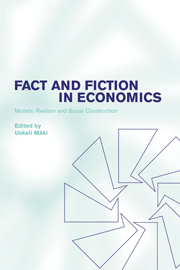Book contents
- Frontmatter
- Contents
- Notes on the contributors
- Preface
- I Introduction
- II Setting the scene
- III Economic models and economic reality
- 5 Credible worlds: the status of theoretical models in economics
- 6 The limits of causal order, from economics to physics
- 7 Econometrics and reality
- 8 Models, stories, and the economic world
- 9 Economic models and reality: the role of informal scientific methods
- 10 Truthlikeness and economic theories
- IV The constitution of economic reality
- V The institutions of economics
- Index
- References
9 - Economic models and reality: the role of informal scientific methods
Published online by Cambridge University Press: 22 September 2009
- Frontmatter
- Contents
- Notes on the contributors
- Preface
- I Introduction
- II Setting the scene
- III Economic models and economic reality
- 5 Credible worlds: the status of theoretical models in economics
- 6 The limits of causal order, from economics to physics
- 7 Econometrics and reality
- 8 Models, stories, and the economic world
- 9 Economic models and reality: the role of informal scientific methods
- 10 Truthlikeness and economic theories
- IV The constitution of economic reality
- V The institutions of economics
- Index
- References
Summary
This bleak alternative between the rationalism of a machine and the irrationalism of blind guessing does not hold for live mathematics [or real economics].
Lakatos 1977, 4Models and mechanisms
The most important question in economic methodology concerns the relationship between economic models and reality. How can economic models based on unrealistic and even false assumptions provide an explanation of real-world economic phenomena? A good starting point is Cartwright's (2002) idea that models are believed to say something about the world because they are intended to describe causal processes or mechanisms operating in the world. In economics, such mechanisms are typically sequences of actions and changes in the constraints facing agents (changes in prices and incomes). They link an initial stimulus to some outcome. Thus the multiplier links a rise in government expenditure (ΔG) to a rise in income greater than ΔG, the mechanism involving a series of steps in which rises in income cause consumers to spend more and rises in spending generate rises in income. Creating a theoretical model involves finding a set of simplifying assumptions such that it is possible to demonstrate, to generally accepted standards of rigor, that the outcome will follow from the initial conditions. The model shows that the mechanism is coherent – that it could operate, if only under some ideal set of conditions.
Cartwright is correct to observe that deriving theoretical results normally requires ‘a very finely honed model’ (2002, 146).
- Type
- Chapter
- Information
- Fact and Fiction in EconomicsModels, Realism and Social Construction, pp. 202 - 213Publisher: Cambridge University PressPrint publication year: 2002
References
- 2
- Cited by



